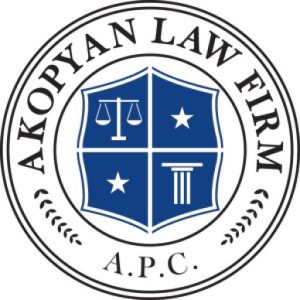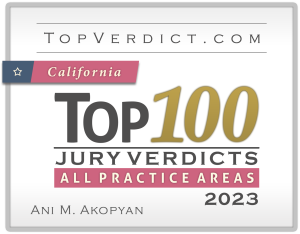Boyle Heights Employment Attorneys
The trial attorneys of the Akopyan Law Firm A.P.C. stand ready to fight for the rights of the residents of Boyle Heights, regardless of whether they are employees or employers. If your cause is just and involves employment law, give us a call to see how we can help.
 Boyle Heights, California
Boyle Heights, California
Boyle Heights is a large neighborhood in Los Angeles. It is one of the City’s most notable and historic Chicano communities and is known as a bastion of Chicano culture, hosting cultural landmarks like Mariachi Plaza and events like the annual Día de los Muertos celebration. Boyle Heights has a rich history. During the Spanish, Mexican, and early American periods it was called Paredón Blanco (“White Bluff”) during the Spanish, Mexican, and early American periods. The area became named after Andrew Boyle, who purchased 22 acres on the bluffs overlooking the Los Angeles River for $4,000. Boyle established his home on the land in 1858. In the 1860s, he began growing grapes and sold the wine under the “Paredon Blanc” name. In the early 1910s, Boyle Heights was one of the only communities that did not have restricted housing covenants that discriminated against the Japanese people and other people of color. The Japanese community of Little Tokyo continued to grow and extended into Boyle Heights in the early 1910s. In the years that followed the area was a center of immigrant life, with waves of immigrants coming to the area from all different corners of the world. Today it’s mostly Latino, though landmarks that capture its multicultural evolution remain. Boyle Heights is situated in east central Los Angeles and is home to more than 100,000 residents. It covers approximately six and a half square miles, and encompasses the following zip codes: 90023, 90033, 90063. The Akopyan Law Firm A.P.C. is headquartered in Los Angeles which is minutes away from Boyle Heights. Our employment lawyers stand ready to provide legal services to both employees and employers in Boyle Heights.
The Search For The Best Employment Lawyer in Boyle Heights
Boyle Heights thrives as a vibrant community, offering its residents a plethora of legal professionals to choose from. When conducting an online search for “Boyle Heights employment lawyer” or “wrongful termination attorney in Boyle Heights,” you’re likely to encounter a deluge of paid advertisements from employment lawyers spanning various locations. The challenge lies in selecting the right attorney, one with the requisite skills and experience, when your options are primarily based on paid internet advertisements. For individuals seeking legal representation, discerning whether a particular attorney possesses the expertise needed for employment trials and litigation can be a formidable task when all they have to rely on is an advertisement. However, at the Akopyan Law Firm, A.P.C., each attorney brings nearly two decades of invaluable experience to the table. Our legal team boasts a well-documented track record of success, effectively advocating for both employees and employers. Our firm’s guiding principle emphasizes quality over quantity. Instead of saturating the market with advertising, our attorneys dedicate their time to the courtroom, passionately fighting for our clients’ rights. We understand that actions speak louder than words, and we wholeheartedly invite you to seek references from satisfied clients upon request. Additionally, you can explore our online reviews to gain added assurance in our capabilities. With conveniently located offices just minutes away from Boyle Heights, we are poised and prepared to offer top-tier legal representation to the residents of Boyle Heights, ensuring that their legal needs are met with the utmost level of expertise and professionalism.
We Offer World Class Service To Boyle Heights Residents In Cases That Involve:
Featured Article:
What “Intolerable Working Conditions” Mean for Constructive Discharge Under California Employment Law
📌 Key Takeaways Working conditions are typically considered “intolerable” for constructive discharge purposes only when they become so severe or pervasive, and so sustained, that a reasonable employee in the same position would feel compelled to resign. Objective and subjective lens: The analysis commonly asks both whether a reasonable person would feel forced to quit (objective) and whether the employee actually resigned because of the conditions (subjective). High threshold: Ordinary workplace friction—unfair criticism, inconvenient schedules, or personality conflicts—often does not meet the legal standard by itself. Patterns matter: Duration, escalation, and whether management knew (or should have known) about the problem—and how management responded—often matter more than a single incident. Concrete examples help show severity: Repeatedly assigning work that conflicts with documented medical restrictions, mocking an employee’s injury, or escalating dangerous assignments after a safety complaint may support an argument that conditions became intolerable, depending on the full context. Overlap is common: The same facts may also implicate disability discrimination, failure to reasonably accommodate, failures in the interactive process, harassment, or retaliation. Constructive discharge analysis generally focuses on extreme workplace conditions, not ordinary dissatisfaction. ~ ~ ~ ~ ~ ~ ~ ~ ~ ~ ~ ~ ~ ~ ~ ~ ~ ~ Many employees resign because work feels unbearable. Under California employment law, a resignation may be treated like a termination in certain circumstances if the employee can show constructive discharge—meaning the employer created, allowed, or failed to correct working conditions that became intolerable under the legal standard. In plain terms, “intolerable working conditions” generally means conditions that are so serious and sustained that a reasonable employee in the same situation would conclude resignation is the only realistic option. Constructive Discharge: A Plain-Language Overview of the Legal Concept constructive discharge or constructive termination is considered to have happened when: Working conditions became intolerable under an objective “reasonable employee” standard, The employee resigned because of those conditions, The intolerable conditions are tied to what the employer did, allowed, or failed to address (for example, management actions, supervisor conduct, or management’s failure to correct known problems). A key takeaway for readers is that the doctrine is not meant to convert every difficult workplace into a termination claim. It is typically reserved for situations where the working conditions are beyond ordinary workplace stress and instead reflect sustained, serious harm. Examples That May Contribute to an Intolerable Environment The following hypotheticals illustrate the type of facts that may support a constructive discharge analysis, depending on severity, duration, documentation, and the employer’s response: Ignoring documented medical restrictions and escalating pressure: An employee provides medical documentation limiting heavy lifting. A supervisor repeatedly assigns heavy-lifting tasks anyway, threatens discipline if the employee refuses, and mocks the injury in front of coworkers. If management knows this is happening and does not intervene, the employee may argue the employer allowed the workplace to become intolerable. Punishing a safety complaint with dangerous work and harassment: An employee reports serious workplace safety hazard. After the report, the supervisor assigns the... Read more









Millions of Dollars Recovered For Our Clients
Check Out Our Case Results



